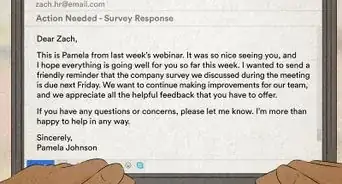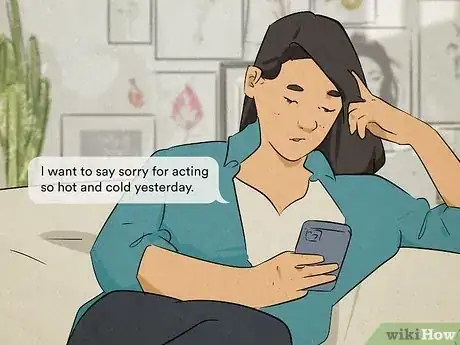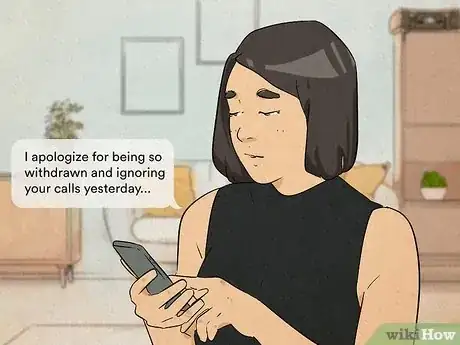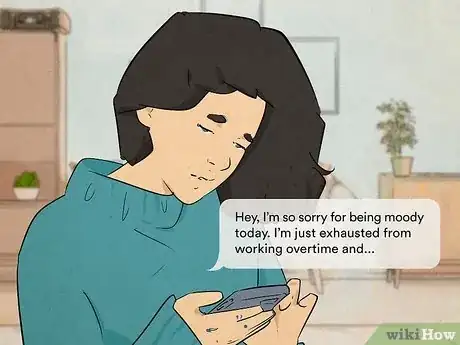This article was co-authored by John Keegan and by wikiHow staff writer, Dan Hickey. John Keegan is a dating coach and motivational speaker based in New York City. He runs The Awakened Lifestyle, where he uses his expertise in dating, attraction, and social dynamics to help people find love. He teaches and holds dating workshops internationally, from Los Angeles to London and from Rio de Janeiro to Prague. His work has been featured in the New York Times, Humans of New York, and Men's Health.
There are 10 references cited in this article, which can be found at the bottom of the page.
This article has been viewed 16,478 times.
Nobody wants to be moody on purpose, but sometimes you just can’t help it. It’s especially tough when being moody puts a strain on your relationship with your boyfriend. If the idea of apologizing seems intimidating, don't worry! We’ve put together a thorough list of psychology-backed ways to craft the perfect apology (in person or over text) with plenty of examples to get you started. Keep reading if you’re ready to apologize to your boyfriend for being moody and make your relationship even stronger.
Steps
Acknowledge that you’ve hurt your boyfriend.
-
Accepting responsibility is necessary for a heartfelt apology. Whether you upset him intentionally or not, a good apology (and healing) starts with realizing that you acted or spoke in a way that caused harm to your boyfriend or relationship.[1] X Research source Imagine how you’d feel if your boyfriend was moody towards you—this empathy can help you acknowledge your actions and plan what to say:
- “I’m sure you’re feeling confused and hurt by how I was acting.”
- “I know you’re upset with me.”
- “You’re angry and tired, and I understand that.”
Use a clear “I’m sorry” statement.
-
Let him know right away that you’re apologizing. Saying “sorry” at the top of your apology is important because it sets the tone of your conversation. Think of these first few words as the launchpad for the rest of your apology.[2] X Research source Begin with something simple like:
- “I’m so sorry that I’ve been moody lately.”
- “I want to apologize for acting so distant this week.”
- “I couldn’t be more sorry about the way I treated you last night.”
- “I want to apologize for the bad joke that I made. It wasn't appropriate humor, and I honestly didn't mean to hurt your feelings.
- If you’re apologizing over text, start with a preface like “I wish I could say this in person. I apologize for being moody” or “I’d rather tell you this face to face, but I’m sorry about the way I’ve been acting.”
Be specific about what you’re apologizing for.
-
Mention specific examples to show you understand what you did. Just saying “I’m sorry” doesn’t show your boyfriend that you get how he feels or how you impacted him (which is what you want to do!). Keep the focus on your actions—things like “I’m sorry you felt mad” or “I’m sorry you misunderstood me” don’t get to the heart of the issue.[3] X Research source Try things like:
- “I’m sorry that I blew up at you last night.”
- “I apologize for giving you the cold shoulder this week.”
- “I want to say sorry for acting so hot and cold yesterday.”
Explain what went wrong.
-
Tell your boyfriend what made you moody without making excuses. Explaining why you felt off or lashed out is helpful, but trying to justify your behavior is not—it puts the blame on him or some other factor instead of yourself.[4] X Research source A good apology doesn’t use “if” or “but” statements (“I’m sorry I was moody, but it’s only because of work” or “I'm sorry if I made you upset”).[5] X Research source Instead, try:
- “I’m sorry I’ve been moody lately. Work has been really stressful lately and I’ve been taking it home with me, which is unfair to you.”
- “I apologize for yelling at you last night. My parents have been on my case all week and I just feel so tense all the time.”
- “I’m so sorry for being unpredictable lately. I had a huge falling out with Katie on Tuesday and the drama of it all has been getting to me. It’s not your fault.”
Show your boyfriend empathy.
-
It’s crucial to show him you understand how you made him feel. This is your chance to show him how much you really care, and it's even more important than saying “I’m sorry.” He’ll be more ready and willing to accept your apology when you show that you understand the effects of your moodiness on him (remember, your apology is about him).[6] X Research source You can say things like:
- “I’m sorry for being so snarky lately. I’m trying to balance too many things and the pressure is getting to me. I know you must feel so confused and hurt when I say mean things.”
- “I apologize for being so withdrawn and ignoring your calls yesterday. I’ve been going through a hard time lately and I can’t help but shut down sometimes. I can imagine it makes you question how I feel about you.”
- “I want to say sorry for blowing up after dinner last night. It wasn't your fault, I’m just really on edge right now because of my roommate situation. I know it was embarrassing for me to yell in public and I’m sure I ruined the night you had planned for us.”
Ask for forgiveness.
-
Wrap up your apology with a request for forgiveness or understanding. It can feel uncomfortable to ask, but it gives your boyfriend the chance to accept your apology, bring up his feelings, or continue the conversation. It also shows you’re humble and that you don’t demand or expect automatic forgiveness.[7] X Research source If you're truly sorry, chances are he can't wait to put this all behind you! Try ending with:
- “I hope you can forgive me.”
- “Do you forgive me?”
- “I know it might take some time, but I really hope you can accept my apology.”
Tell him you’ll adjust.
-
Explain how you’ll make changes to avoid being moody later. This can be part of your initial apology, or you can add it in later in your conversation. Your words mean more if you’re willing to make real changes to back them up. This will make him feel confident that you two can avoid repeating the scenario in the future.[8] X Research source Say:
- “I’m going to work on managing my stress so I’m not taking it out on you.”
- “I’ll be better about keeping work at work so I can be my best self around you.”
- “I promise to be more open about my feelings so I’m not so moody all of a sudden.”
Keep it clear and direct.
-
A straightforward apology is easier to process and respond to. Over-apologizing can sound self-indulgent and takes the focus off your boyfriend and his needs. Say what you need to say in simple terms—you can elaborate more later if you need to.[9] X Research source A full apology (in person or over text) might look like:
- “Hey, I’m so sorry for being moody today. I’m just exhausted from working overtime and my fuse is short. I know you’re probably confused and worried about me. I promise I’ll work on balancing work better so I can be in a good mood when we’re together. I hope you can forgive me.”
- “I want to apologize for giving you the silent treatment. I’m just really upset that I didn’t pass the bar exam and I’m taking it out on you, which is completely unfair. I completely understand why you’re angry and hurt by it. Do you forgive me?”
- “I’m sorry for being moody this week. I haven’t been able to get any down time since I got back from my trip and it’s getting to me. You’re frustrated with me and worried that I’m not acting like myself, and I appreciate that. Can you forgive me?”
Mean what you say.
-
Be sincere and let your apology speak for itself. An honest apology doesn’t have any agenda other than to repair the damage done by your words or actions. Your boyfriend shouldn’t feel like you’re trying to get him to change his mind, take blame, or manipulate his feelings. To be sincere, keep your explanations brief and all about you (not what your boyfriend might have done).[10] X Research source Your explanations might sound like:
- “I’m still just upset about losing my scholarship.”
- “I’ve been feeling down and moody since my parents split up.”
- “I’m still adjusting to my new work schedule and I’m so stressed out.”
Match your body language to your words.
-
If you’re apologizing in person, show him you’re sorry. Make eye contact and nod along as he responds to you to show you care about what he’s saying. Mirror his position—if he’s standing and facing you, stand and face him back so your shoulders are parallel. If he’s sitting down, sit down beside him.[11] X Research source
- Your tone is important too. Speak low and softly to sound even-tempered and sincere.
- Some affectionate touching, like a hug or holding hands, can help show that you mean what you say.
Actively listen to him.
-
Fight the urge to interrupt or defend yourself while he responds. Be patient and let him say what he has to say. Listening shows that you care about his feelings and it gives you the chance to learn about your impact and how you can avoid the same mistakes in the future.[12] X Research source Show you’re listening with phrases like these:
- “I understand where you’re coming from.”
- “Is there anything else you want me to know?”
- “Can you go more in-depth about that?”
- He’ll grow more comfortable opening up to you when you show him you can listen without reacting harshly, correcting him, or cutting him off.
Ask him what he needs.
-
Be curious about what you can do to make your boyfriend feel better. Sometimes, a heartfelt apology is enough to find resolution. Other times, you’ll have to work together to come up with a solution that works for both of you (think of it as a learning opportunity). Just by asking, you’re showing interest in him that lets him know you care.[13] X Research source Ask things like:
- “What can I do to make up for my lousy behavior?”
- “Is there anything I can do to make you feel better?”
- “Please let me know how I can make this up to you.”
Follow up in person.
-
If you apologized over text, continue the conversation face to face later. A strong apology text includes a plan to meet IRL. Your facial expressions, tone, and body language all get lost over text—meeting in person is the best way to show real empathy and connect.[14] X Research source You can say:
- “Can we grab coffee tomorrow to talk more?”
- “Let’s get together soon—I really want to see you and make this OK.”
- “Why don’t you come over tonight and we can get on the same page?”
Follow through on your apology.
-
The best apology is changed behavior. Show you care about your boyfriend and that you’ve learned from the past by demonstrating more compassion when you’re feeling moody. It’ll keep your relationship in good spirits and help you cope with stressful emotions, too. Here are a few ways to tone down moodiness:[15] X Research source
- Schedule some quiet or alone time for yourself to give your mind a break. Meditating, reading, or a bubble bath are great ways to take a breather.
- Go for a walk or run to work out some nervous energy. Even just a casual stroll will help clear your mind.
- Show yourself compassion. Acknowledge that you’re not in a great mood and try to imagine how that might impact the people around you, including your boyfriend.
You Might Also Like
 33 Sweet & Romantic Apology Messages for Your Love
33 Sweet & Romantic Apology Messages for Your Love

 How Long Should I Wait to Text My Ex-Girlfriend?
How Long Should I Wait to Text My Ex-Girlfriend?
 How Long Does the No Contact Rule Take to Work?
How Long Does the No Contact Rule Take to Work?



 How to Politely Remind Someone to Reply to You
How to Politely Remind Someone to Reply to You
 What Should You Do After Your Girlfriend Lies to You?
What Should You Do After Your Girlfriend Lies to You?

 How Normal Is Fighting in a Relationship? Healthy vs. Toxic Fights
How Normal Is Fighting in a Relationship? Healthy vs. Toxic Fights


 How to Deal with Confusing People: 11 Ways to Navigate the Situation
How to Deal with Confusing People: 11 Ways to Navigate the Situation
References
- ↑ https://www.psychologytoday.com/us/blog/stronger-the-broken-places/201308/read-you-apologize-her-or-him
- ↑ https://www.psychologytoday.com/us/blog/the-squeaky-wheel/201311/the-five-ingredients-effective-apology
- ↑ https://psychcentral.com/blog/how-to-make-an-adept-sincere-apology#4
- ↑ https://psychcentral.com/lib/im-sorry-how-to-make-a-true-apology-and-find-forgiveness#4
- ↑ https://www.npr.org/2021/06/02/1002446748/youre-apologizing-all-wrong-heres-how-to-say-sorry-the-right-way
- ↑ https://www.psychologytoday.com/us/blog/the-squeaky-wheel/201311/the-five-ingredients-effective-apology
- ↑ https://www.psychologytoday.com/us/blog/the-squeaky-wheel/201311/the-five-ingredients-effective-apology
- ↑ https://www.psychologytoday.com/us/blog/friendship-20/201906/how-apologize-8-tips-keep-in-mind
- ↑ https://www.npr.org/2021/06/02/1002446748/youre-apologizing-all-wrong-heres-how-to-say-sorry-the-right-way
- ↑ https://www.psychologytoday.com/us/blog/stronger-the-broken-places/201308/read-you-apologize-her-or-him
- ↑ https://qz.com/quartzy/1132594/this-is-how-to-apologize-like-you-actually-mean-it/
- ↑ https://www.psychologytoday.com/us/blog/stronger-the-broken-places/201308/read-you-apologize-her-or-him
- ↑ https://www.psychologytoday.com/us/blog/stronger-the-broken-places/201308/read-you-apologize-her-or-him
- ↑ https://qz.com/quartzy/1132594/this-is-how-to-apologize-like-you-actually-mean-it/
- ↑ https://www.psychologytoday.com/us/blog/the-squeaky-wheel/201510/7-quick-ways-stop-being-irritable
- ↑ https://psychcentral.com/blog/how-to-make-an-adept-sincere-apology#3
About This Article



























































